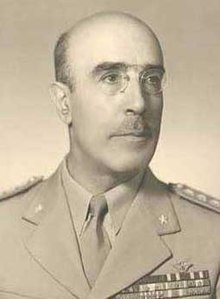Luigi Efisio Marras
Luigi Efisio Marras (born August 2, 1888 in Cagliari , † January 28, 1981 in Rome ) was an Italian general . Marras was (with a short interruption) from 1936 to 1943 the Italian military attaché in Germany and head of the Italian delegation at the Wehrmacht High Command .
Military career
Marras was born in Sardinia and grew up there. In November 1906 he began his training at the Military Academy in Turin . After graduation, he served as an officer in various artillery units . In the course of the Italo-Turkish War he took part in the occupation of the Dodecanese . In the First World War he fought against the Central Powers in the Balkans, among other places . After the war, Marras completed general staff training and then worked in the operations department of the Army General Staff. From 1926 he served in a field artillery regiment in Livorno and at the same time taught land warfare at the local naval academy . After serving with the new general staff, he was promoted to colonel in 1931 and was given command of a heavy artillery regiment until 1936.
In October 1936, Marras became the Italian military attaché in Berlin . In this role he was also responsible for some northern European and Baltic states. Marras, who soon became known for his courteous manner, wrote several reports about the German armed forces in the rearmament phase and, among other things, about the general staff training at the war academy . He drew an unusually precise picture of the German armaments efforts, of the practical and pragmatic German officer training, but also of human facets and weaknesses such as pride and arrogance .
From July to November 1939 he worked in Rome and with a staff in Libya , but was then transferred back to Berlin. There he expanded his service to the Italian military mission at OKW and undertook numerous business trips to various fronts, as a result of which he repeatedly sent reports to Rome that relentlessly portrayed the military situation.
After Mussolini was deposed, Marras was received by Hitler on July 30, 1943, affirming that Italy wanted to continue the war and that Hitler should meet with Badoglio as soon as possible. After Italy left the Axis in September 1943 , Marras , who had meanwhile been promoted to Lieutenant General , was interned in Germany. On March 31, 1944, the German authorities handed him over to Mussolini's remaining fascist republic in northern Italy. Marras was imprisoned first in Verona and then in Gavi near Alessandria . In August 1944 he managed to escape to Switzerland .
From May 1945 he headed a military territorial command ( military district ) in Milan . On December 1, 1947, Marras became Chief of Staff of the Army, on December 2, 1950, Chief of Staff of the Armed Forces. In these functions he contributed significantly to the reconstruction of the Italian army . He retired from active service on April 15, 1954.
Marras died in 1981 at the age of 92.
literature
The military history office of the Italian Army published a book (in Italian) about Marras in the 1990s, which describes his work as a military attaché in Berlin. In addition, it offers a number of insights into the inner workings of the Wehrmacht and into German-Italian military relations in this era.
Sergio Pelagalli: Il Generale Efisio Marras - Addetto Militare a Berlino (1936-1943). USSME, Rome, 1994.
Web links
Individual evidence
- ↑ Files on German Foreign Policy 1918-1945, Series E: 1941-1945 Volume VI, Göttingen 1979, p. 347f.
| personal data | |
|---|---|
| SURNAME | Marras, Luigi Efisio |
| BRIEF DESCRIPTION | Italian general |
| DATE OF BIRTH | August 2, 1888 |
| PLACE OF BIRTH | Cagliari |
| DATE OF DEATH | January 28, 1981 |
| Place of death | Rome |
